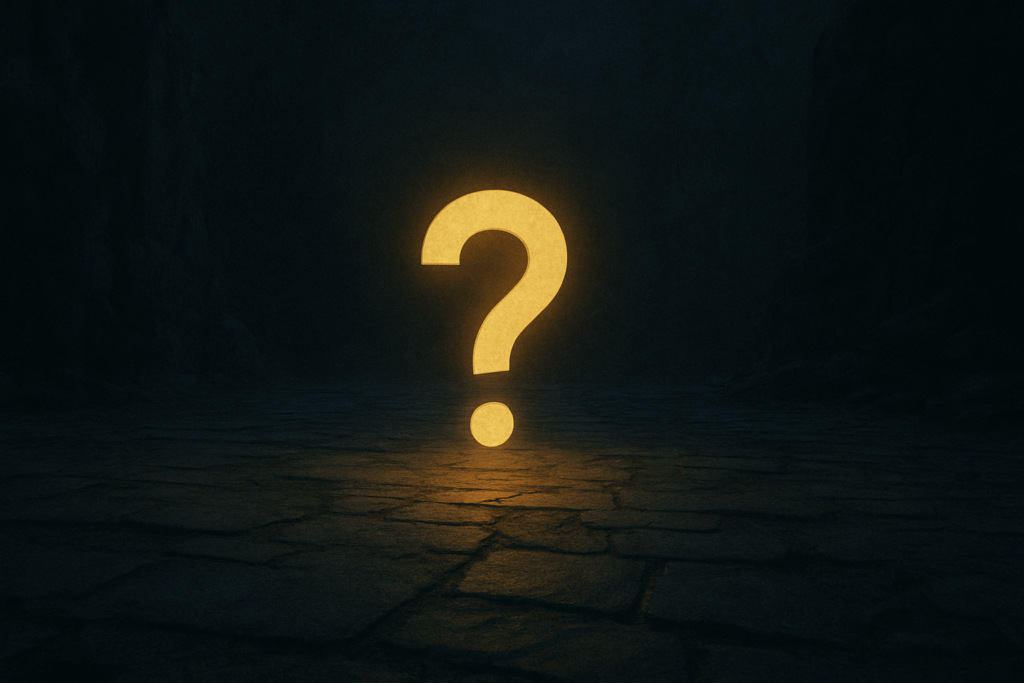
Modern games are obsessed with waypoints. You boot up an open-world title, and your map looks like a GPS threw up—icons, quest markers, collectibles, vendors, points of interest. Follow the breadcrumb trail. Repeat.
It’s efficient. It’s convenient. It’s also numbing.
Some games take the opposite approach. They trust you to pay attention to the world, to learn the landmarks, to listen to NPCs and follow environmental clues—without handing you a glowing line to chase.
If you miss that feeling of getting lost, thinking for yourself, or genuinely discovering things, here are ten games that ditch the hand-holding and let you engage on your own terms.
Morrowind
Platform: PC, Xbox (original & mods)
This is the blueprint. Morrowind doesn’t hold your hand because it doesn’t think it needs to. When a character gives you a quest, they’ll say something like “travel northeast past the Dwemer ruin, cross the river, and look for a cave near a cluster of mushroom trees.” That’s your guidance. No compass, no glowing trail, no minimap pings. If you get lost—and you will—you either retrace your steps, explore, or ask for help. The game expects you to learn the geography of Vvardenfell the way you’d learn a real place: gradually, imperfectly, and with a growing sense of orientation that lives in your memory, not your UI. It’s disorienting at first, and deeply rewarding once it clicks.
S.T.A.L.K.E.R. series
Platform: PC
The Zone is not here to help you. In Shadow of Chernobyl, Clear Sky, and Call of Pripyat, you’re not the chosen one—you’re just another scavenger trying not to die. The maps are more suggestion than guidance: hand-drawn looking, limited in detail, and completely indifferent to your confusion. Getting from point A to B means watching the sky, counting your bullets, and praying you don’t step into a radioactive pit or an invisible anomaly. Every trip feels like it could go sideways. There are no quest arrows, just vague instructions and the distant shape of something that might be a landmark. This is exploration with teeth: atmospheric, hostile, and brutally grounded.
Kingdom Come: Deliverance
Platform: PC, PS4, Xbox
Set in a meticulously reconstructed 15th-century Bohemia, Kingdom Come aims for realism not just in combat and history, but in how you get around. Directions come from NPCs in the form of natural speech—“take the road west, follow the river until you see a burned-out mill”—and your map, while detailed, offers no GPS-style navigation. Signposts, village names, and terrain features are what matter. You navigate like someone actually would in 1403, and that means getting lost is part of the experience. Over time, you build a mental map not just of roads and towns, but of rhythms: which path is safest at night, which forest is easy to miss. The result is a rare thing in games—travel that feels physical.
Dark Souls
Platform: Multi
Dark Souls doesn’t do maps. It doesn’t do quest markers. What it does is force you to understand space. Every shortcut you find, every elevator that connects back to an earlier bonfire, every rooftop that leads to a forgotten alley—these are learned through repetition, pain, and observation. The world is a single, massive knot of paths and secrets, and your only tools are memory and persistence. NPCs speak in cryptic half-truths. Objectives are implied more than stated. If you don’t pay attention, you miss things—not because the game is unfair, but because it’s honest. If you know the world, you thrive. If you don’t, you die. And either way, you’re learning.
Outer Wilds
Platform: Multi
You wake up on a planet with a spaceship and a 22-minute time loop before the sun goes supernova. That’s it. No missions. No waypoints. The game simply asks: what do you want to know? Outer Wilds is built entirely around curiosity. You explore a miniature solar system, chasing down rumors, following environmental clues, and slowly piecing together a centuries-old mystery. Every discovery is tied to something you chose to investigate. Progress is cognitive, not mechanical—you don’t unlock abilities, you unlock understanding. And because the universe resets every loop, your only real asset is what you’ve learned. It’s a game that makes information feel like treasure.
Elden Ring
Platform: Multi
It has a map. That’s about where the similarities to modern open-world design end. Elden Ring refuses to spell things out. The world is enormous, layered, and full of secrets that you’re likely to miss if you don’t wander off the beaten path. Some of its most interesting dungeons, bosses, and storylines are optional—and easy to overlook. NPCs give vague hints and then vanish. Questlines don’t log themselves. You’re expected to pay attention to dialogue, to surroundings, to the shape of ruins and the direction of a crumbling road. The game rewards curiosity and punishes passivity. You don’t discover things because a system told you to. You discover them because you looked.
La-Mulana
Platform: PC, Vita, Switch
This is not a game that wants you to succeed quickly. La-Mulana is punishing, cryptic, and unapologetically dense. It’s styled like an old MSX-era adventure title, but don’t mistake the retro visuals for simplicity. There are no hint systems, no quest logs, and no obvious progression. Everything is buried under layers of riddles, symbols, environmental cues, and ancient language. You will take notes. You will misread clues. You will solve something three hours after you first encountered it, when a throwaway line suddenly makes sense. It’s a game that demands patience, lateral thinking, and a high tolerance for frustration—but the reward is a genuine sense of discovery, rare in modern design.
Pathologic 2
Platform: PC
Pathologic 2 is bleak, strange, and uncomfortable in every way that matters. You’re dropped into a town gripped by plague, suspicion, and occult dread, and your job is to survive while trying to save others. The map doesn’t update automatically. Clues come from conversations—fragmented, unreliable, and laced with metaphor. Time moves forward constantly. Every decision costs you something. Directions are imprecise, and help is rare. The game doesn’t mark the “right” choice, because there isn’t one. It doesn’t guide you to safety, because safety is an illusion. What you’re navigating isn’t just a town, but a moral and psychological maze. Getting lost is part of the message.
Return of the Obra Dinn
Platform: PC, Switch, PS4
The ship is silent. Everyone is dead. Your job is to find out what happened. In Obra Dinn, there are no missions, no hints, no guiding hand. You have a magical watch that lets you see the moment of someone’s death—and from that, you’re supposed to deduce identities, causes, and connections across 60 vanished souls. It’s a pure logic puzzle built from spatial awareness, sound design, character modeling, and careful observation. The game never says “you’re getting warm.” You either figure it out, or you don’t. There is no filler, no fluff, and no scaffolding. It’s just you, your notes, and your ability to pay attention.
Disco Elysium
Platform: Multi
This is a detective RPG, but not one that cares about leading you. Conversations branch endlessly. Leads dry up. Entire storylines can vanish if you’re not paying attention. The game won’t remind you where to go next or what you’ve missed. There’s no fast travel, no glowing exclamation points. The city of Revachol unfolds as a living space, not a checklist. You make progress by reading, by listening, by thinking. And sometimes by failing. What you piece together from the world isn’t just the case—you’re piecing together yourself. It’s not about finding the objective. It’s about building meaning from fragments, and trusting your instincts when nothing else is pointing the way.


